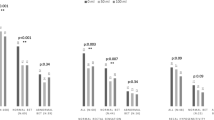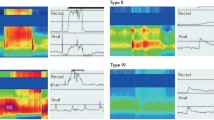Abstract
Background
Although chronically constipated patients usually respond to medical treatment, there is a subgroup with scarce/no response, generally labeled as refractory or intractable. However, whether this lack of response is real or due to ancillary causes (suboptimal dosage, lack of compliance etc.) is unknown.
Aims
To see whether a pharmacologic test (bisacodyl colonic intraluminal infusion during manometric assessment) may predict the therapeutic outcome.
Methods
Data of patients undergoing 24/h colonic manometry for severe intractable constipation in whom the bisacodyl test (10 ml of drug dissolved into saline and injected through the more proximal recording port) had been carried out were retrieved and analysed, and correlations with the therapeutic outcome made.
Results
Overall, charts from 38 patients (5 men) were available; of these, only 21% displayed naive high-amplitude propagated contractions (average, less than 2/24 h), mostly meal-induced, during the recordings. A bisacodyl response was present in 31.6% patients, with a mean number of events of 1.8 per patient. After bisacodyl testing, 47.3% patients underwent intensive medical treatment, 44.7% surgery (medical failures), and 8% transanal irrigation, a procedure employed to treat refractory patients. The presence of naive propulsive contractions significantly correlated with the response to bisacodyl infusion (p < 0.0001), and with a favourable outcome to intensive medical treatment (p < 0.0001).
Conclusions
The bisacodyl test may be clinically useful to better categorize constipated patients erroneously labelled as intractable and to exclude true colonic inertia, thus avoiding surgery in more than 30% of these subjects.


Similar content being viewed by others
References
Bassotti G, Villanacci V. A practical approach to diagnosis and management of functional constipation in adults. Intern Emerg Med. 2013;8:275–282.
Gaburri M, Bassotti G, Bacci G, et al. Functional gut disorders and health care seeking behavior in an Italian non-patient population. Recenti Prog Med. 1989;80:241–244.
Neri L, Basilisco G, Corazziari E, et al. Constipation severity is associated with productivity losses and healthcare utilization in patients with chronic constipation. United European Gastroenterol J. 2014;2:138–147.
Bassotti G. Being constipated: a bad omen for your cardiovascular system? Atherosclerosis. 2016;245:240–241.
Bellini M, Usai-Satta P, Bove A, et al. Chronic constipation diagnosis and treatment evaluation: the “CHRO.CO.DI.T.E”. study. BMC Gastroenterol. 2017;17:11.
Bassotti G. Understanding constipation treatment: Do we need to strain to obtain better results? Expert Opin Drug Metab Toxicol. 2013;9:387–389.
Bharucha AE, Pemberton JH, Locke GR. American Gastroenterological Association technical review on constipation. Gastroenterology. 2013;144:218–238.
Wofford SA, Verne GN. Approach to patients with refractory constipation. Curr Gastroenterol Rep. 2000;2:389–394.
Bassotti G, Blandizzi C. Understanding and treating refractory constipation. World J Gastrointest Pharmacol Ther. 2014;5:77–85.
Bove A, Bellini M, Battaglia E, et al. Consensus statement AIGO/SICCR diagnosis and treatment of chronic constipation and obstructed defecation (part II: treatment). World J Gastroenterol. 2012;18:4994–5013.
Lee YY. What’s new in the toolbox for constipation and fecal incontinence? Front Med (Lausanne). 2014;1:5.
Shin JE, Jung HK, Lee TH, et al. Guidelines for the diagnosis and treatment of chronic functional constipation in Korea, 2015 Revised Edition. J Neurogastroenterol Motil. 2016;22:383–411.
Chiarioni G, Whitehead WE, Pezza V, Morelli A, Bassotti G. Biofeedback is superior to laxatives for normal transit constipation due to pelvic floor dyssynergia. Gastroenterology. 2006;130:657–664.
Chiarioni G, Bassotti G. Biofeedback therapy for constipation due to dyssynergic defecation: ready for prime time. Tech Coloproctol. 2015;19:331–332.
Bassotti G, Chiarioni G, Vantini I, et al. Anorectal manometric abnormalities and colonic propulsive impairment in patients with severe chronic idiopathic constipation. Dig Dis Sci. 1994;39:1558–1564.
Bassotti G, Chistolini F, Nzepa FS, Morelli A. Colonic propulsive impairment in intractable slow-transit constipation. Arch Surg. 2003;138:1302–1304.
Dinning PG, Zarate N, Hunt LM, et al. Pancolonic spatiotemporal mapping reveals regional deficiencies in, and disorganization of colonic propagating pressure waves in severe constipation. Neurogastroenterol Motil. 2010;22:e340–e349.
Redmond JM, Smith GW, Barofsky I, Ratych RE, Goldsborough DC, Schuster MM. Physiological tests to predict long-term outcome of total abdominal colectomy for intractable constipation. Am J Gastroenterol. 1995;90:748–753.
Bassotti G, Betti C, Pelli MA, Morelli A. Extensive investigation on colonic motility with pharmacological testing is useful for selecting surgical options in patients with inertia colica. Am J Gastroenterol. 1992;87:143–147.
Camilleri M, Bharucha AE, di Lorenzo C, et al. American Neurogastroenterology and Motility Society consensus statement on intraluminal measurement of gastrointestinal and colonic motility in clinical practice. Neurogastroenterol Motil. 2008;20:1269–1282.
Dinning PG, Benninga MA, Southwell BR, Scott SM. Paediatric and adult colonic manometry: a tool to help unravel the pathophysiology of constipation. World J Gastroenterol. 2010;16:5162–5172.
Nelson AD, Camilleri M, Chirapongsathorn S, et al. Comparison of efficacy of pharmacological treatments for chronic idiopathic constipation: a systematic review and network meta-analysis. Gut. 2017;66:1611–1622.
Preston DM, Lennard-Jones JE. Pelvic motility and response to intraluminal bisacodyl in slow-transit constipation. Dig Dis Sci. 1985;30:289–294.
Shouler P, Keighley MR. Changes in colorectal function in severe idiopathic chronic constipation. Gastroenterology. 1986;90:414–420.
Varma JS, Bradnock J, Smith RG, Smith AN. Constipation in the elderly. A physiologic study. Dis Colon Rectum. 1988;31:111–115.
De Schryver AM, Samsom M, Smout AI. Effects of a meal and bisacodyl on colonic motility in healthy volunteers and patients with slow-transit constipation. Dig Dis Sci. 2003;48:1206–1212.
Bassotti G, Chiarioni G, Germani U, Battaglia E, Vantini I, Morelli A. Endoluminal instillation of bisacodyl in patients with severe (slow transit type) constipation is useful to test residual colonic propulsive activity. Digestion. 1999;60:69–73.
Bassotti G. If it is inert, Why does it move? Neurogastroenterol Motil. 2004;16:395–396.
Hervé S, Savoye G, Behbahani A, Leroi AM, Denis P, Ducrotté P. Results of 24-h manometric recording of colonic motor activity with endoluminal instillation of bisacodyl in patients with severe chronic slow transit constipation. Neurogastroenterol Motil. 2004;16:397–402.
Bharucha AE. High amplitude propagated contractions. Neurogastroenterol Motil. 2012;24:977–982.
Longstreth GF, Thompson WG, Chey WD, Houghton LA, Mearin F, Spiller RC. Functional bowel disorders. Gastroenterology. 2006;130:1480–1491.
Bassotti G, Gaburri M. Manometric investigation of high-amplitude propagated contractile activity of the human colon. Am J Physiol. 1988;255:G660–G664.
Kendall M. A new measure of rank correlation. Biometrika. 1938;30:81–89.
Bassotti G, Gambaccini D, Bellini M. Prucalopride succinate for the treatment of constipation: an update. Expert Rev Gastroenterol Hepatol. 2016;10:291–300.
Christensen P, Krogh K, Perrouin-Verbe B, et al. Global audit on bowel perforations related to transanal irrigation. Tech Coloproctol. 2016;20:109–115.
Kamm MA, Van der Sijip JRM, Lennard-Jones JE. Colorctal and anal motility during defecation. Lancet. 1992;339:820.
Kamm MA, van der Sijp JR, Lennard-Jones JE. Observations on the characteristics of stimulated defaecation in severe idiopathic constipation. Int J Colorectal Dis. 1992;7:197–201.
Manabe N, Cremonini F, Camilleri M, Sandborn WJ, Burton DD. Effects of bisacodyl on ascending colon emptying and overall colonic transit in healthy volunteers. Aliment Pharmacol Ther. 2009;30:930–936.
Giorgio V, Borrelli O, Smith VV, et al. High-resolution colonic manometry accurately predicts colonic neuromuscular pathological phenotype in pediatric slow transit constipation. Neurogastroenterol Motil. 2013;25:70–78.
Borrelli O, Pescarin M, Saliakellis E, et al. Sequential incremental doses of bisacodyl increase the diagnostic accuracy of colonic manometry. Neurogastroenterol Motil. 2016;28:1747–1755.
van den Berg MM, Hogan M, Caniano DA, Di Lorenzo C, Benninga MA, Mousa HM. Colonic manometry as predictor of cecostomy success in children with defecation disorders. J Pediatr Surg. 2006;41:730–736.
Bassotti G, Roberto GD, Sediari L, Morelli A. Toward a definition of colonic inertia. World J Gastroenterol. 2004;10:2465–2467.
Dinning PG, Wiklendt L, Gibbins I, et al. Low-resolution colonic manometry leads to a gross misinterpretation of the frequency and polarity of propagating sequences: initial results from fiber-optic high resolution manometry studies. Neurogastroenterol Motil. 2013;25:e640–e649.
Singh S, Heady S, Coss-Adame E, Rao SS. Clinical utility of colonic manometry in slow transit constipation. Neurogastroenterol Motil. 2013;25:487–495.
Dudekula A, Huftless S, Bielefeldt K. Colectomy for constipation: time trends and impact based on the US Nationwide Inpatient Sample, 1998–2011. Aliment Pharmacol Ther. 2015;42:1281–1293.
Johanson JF, Kralstein J. Chronic constipation: a survey of the patient perspective. Aliment Pharmacol Ther. 2007;25:599–608.
Corsetti M, Pagliaro G, Demedts I, et al. Pan-colonic pressurizations associated with relaxation of the anal sphincter in health and disease: a new colonic motor pattern identified using high-resolution manometry. Am J Gastroenterol. 2017;112:479–489.
Dinning PG, Sia TC, Kumar R, et al. High-resolution colonic motility recordings in vivo compared with ex vivo recordings after colectomy, in patients with slow transit constipation. Neurogastroenterol Motil. 2016;28:1824–1835.
Chen JH, Yu Y, Yang Z, et al. Intraluminal pressure patterns in the human colon assessed by high-resolution manometry. Sci Rep. 2017;7:41436.
Keller J, Bassotti G, Clarke J, et al. Advances in the diagnosis and classification of gastric and intestinal motility disorders. Nat Rev Gastroenterol Hepatol 2018 (in press).
Acknowledgments
Specific authors’ contribution: EB carried out the manometric procedures and analysed the tracings; MG carried out the manometric procedures; MPD reviewed the text for important intellectual contributions; GB planned the study, analysed the data, and wrote the first draft of the manuscript. All authors reviewed and approved the final version of the manuscript.
Author information
Authors and Affiliations
Corresponding author
Ethics declarations
Conflict of Interest
None.
Rights and permissions
About this article
Cite this article
Battaglia, E., Grassini, M., Dore, M.P. et al. Usefulness of Bisacodyl Testing on Therapeutic Outcomes in Refractory Constipation. Dig Dis Sci 63, 3105–3111 (2018). https://doi.org/10.1007/s10620-018-4988-5
Received:
Accepted:
Published:
Issue Date:
DOI: https://doi.org/10.1007/s10620-018-4988-5




